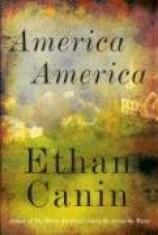America America
Review
America America
In a 2005 Washington Monthly essay entitled “Why Americans Can’t Write Political Fiction,” Christopher Lehmann laments the dearth of enduring works of literature that have as their subject democratic politics --- what he calls “the country’s national epic.” Robert Penn Warren’s classic ALL THE KING’S MEN is likely the first that comes to mind, and for some the short stories and novels (THE CONGRESSMAN WHO LOVED FLAUBERT and ECHO HOUSE among the most noteworthy) of the grossly underappreciated Ward Just may follow close behind, and yet it’s hardly a long list. In his latest novel, Ethan Canin takes a grab for this elusive brass ring. And while he doesn’t quite attain it, he nonetheless has produced an admirable and appealing work.
Set in the small western New York town of Saline, AMERICA AMERICA weaves together two main threads: the story of Henry Bonwiller, a liberal senator from New York, who pursues the Democratic presidential nomination in 1972, only to be undone by his own arrogance and moral blindness, and the coming of age of Corey Sifter, a local teenager whose circumstance brings him into the orbit of Bonwiller’s bright political sun.
Corey, the novel’s narrator, is now the middle-aged publisher of the local newspaper viewing the story’s principal events from a distance of 35 years, shortly after Bonwiller has died, his political career a distant memory. Corey is the only child of a plumber and homemaker, and in 1971, at age 16, he is hired to work part-time at Aberdeen West, the estate of the Metarey family, whose wealth helped to build the town’s economy and whose benevolence now sustains it. Corey’s arrival at the estate coincides with Bonwiller’s decision to run for president, and the young man becomes a bystander as the campaign unfolds. As his role subtly shifts from that of a handyman for the Metareys to low-level campaign assistant, Corey slowly is exposed to political life in all its undeniable, adrenaline-filled appeal.
Liam Metarey, son of a ruthless, union-busting coal and lumber baron who emigrated from Scotland and established the family fortune, serves as Bonwiller’s principal campaign adviser, as well as mentor and surrogate father to Corey. Metarey is the novel’s moral center, tutoring Corey on the ways of the world and teaching him, if only indirectly, about the compromises that too often must be made in politics and in life. He’s a man, as Corey describes him, “with unparalleled access to the world but who still somehow retained a sense of justice, and whose life was in large part measured by his gifts to the community.”
Where Canin’s novel ultimately disappoints is in its portrayal of Henry Bonwiller. We learn that he is an ardently anti-war, pro-union politician who is beloved by working class people like Corey’s parents. Despite the compassion he displays in his political life, at his core is an ethical black hole that allows him to embark on an affair with JoEllen Charney, a small town beauty pageant winner and legal secretary some 25 years his junior. What’s missing from the story is the perspective of a narrator with an ability to fully grasp Bonwiller’s complexity; his power to inspire unswerving devotion in his followers while his life lurches toward self-destruction. Realistically, Corey is not privy to the backroom meetings between Metarey, Bonwiller and the campaign’s advisers, and so his observations of Bonwiller’s campaign are mostly filtered through the perceptions of Metarey, shared in frequent conversations with his protégé. At best, the mature Corey is left to muse over his surprise that “mass politics is an emotional struggle above all, a primal battle that is more charismatic and animalistic than either ethical or reasoned,” or how at times in politics “the ritual of deference precedes the auction of influence, and eventually the orgy of slaughter.”
Everything about Canin’s elegiac novel is ambitious, from the echoing words of its title to his willingness to embrace large themes --- class differences, politics and morality, ambition and failure --- to its generational sweep across a turbulent period of recent American history. Perhaps one of the problems such a talented writer encounters in crafting a political novel worthy of its subject matter lies in the intimacy anyone who watches CNN or MSNBC already feels to the process and those enmeshed in it. If Canin’s effort falls just short, it’s not for want of trying. AMERICA AMERICA is a serious, engaging story that may cause us in this election year to reflect more thoughtfully on the heavy price political life sometimes exacts from its practitioners.
Reviewed by Harvey Freedenberg(mwn52@aol.com) on December 22, 2010
America America
- Publication Date: June 24, 2008
- Genres: Fiction
- Hardcover: 480 pages
- Publisher: Random House
- ISBN-10: 0679456805
- ISBN-13: 9780679456803





